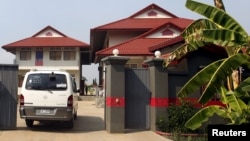Of the five refugees Cambodia has settled as part of a controversial $41 million deal with the Australian government, at least three have returned home.
On Tuesday, government officials in Phnom Penh said an Iranian couple returned home after only a few months in Cambodia, the announcement coming some nine months after an ethnic Rohingya man from Myanmar left in June 2015.
Refugees coming to Cambodia through the Canberra-financed program had sought asylum in Australia, but were housed at facilities on the South-Pacific island of Nauru. Human rights organizations have reported unhealthy living conditions at the Nauru encampment, which is also financed by Australia and shelters 600 asylum seekers.
Kem Sarin, a spokesman for Cambodia's Ministry of Interior, told VOA Khmer the Iranian couple had become “homesick and decided to return their home country” on Feb. 12.
That leaves just one Rohingya and one Iranian refugee remaining in Cambodia under the deal. Kem Sarin said both refugees remain under the watch of the resettlement program run by the Ministry of Interior, and that both are studying Khmer.
There are no applications from other refugees on Nauru to be resettled in Cambodia, he added.
Word of the recent departures casts new doubt on a program that has been widely criticized by rights groups as contradictory to the spirit of international law.
Suon Bunsak, executive secretary for the Cambodian Human Rights Action Committee, told VOA Khmer the resettlement program has been a “failure” and “disappointment.”
Cambodia should not accept any more refugees, he said, because the country’s insufficient public services constitute “a violation of refugees’ rights.”
According to The Associated Press, a statement released by Australian immigration officials said Canberra remains committed to Phnom Penh's efforts to resettle refugees.
“The Government holds firm on our policy that you if arrive by boat [to Australia] then you can either return to your country of origin or be resettled in a third country,” the statement said in part.
This report was produced in collaboration with VOA's Khmer Service.




